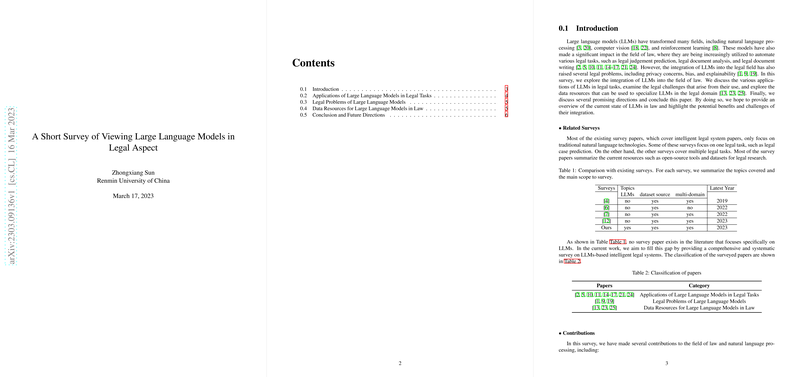Introduction to the Survey
LLMs have advanced various sectors, including law. This survey conducts a comprehensive evaluation of the integration of LLMs within legal environments, discussing applications, challenges, and data resources specific to the legal domain. The paper distinctively contributes to the scholarly discourse by providing an extensive overview of LLM applications in legal tasks—ranging from legal judgment prediction to document drafting—whilst also identifying and scrutinizing the pertinent legal concerns such as privacy, bias, and the need for transparency in AI-driven legal processes.
Legal Application of LLMs
The utilization of LLMs has shown substantial potential in legal judgment prediction and statutory reasoning. For example, a paper examined the Legal Prompt Engineering approach for LLMs, demonstrating their effectiveness on multilingual datasets. Dynamic few-shot prompting techniques have allowed models like GPT-3 to perform exceptionally well in tasks requiring sophisticated legal reasoning. Studies have also highlighted the use of Chain-of-Thought prompting in enhancing LLM performance in logical reasoning tasks. However, the pervasive concern remains regarding the ethical use of LLMs in legal education and practice. The paper investigates how LLMs can assist law educators, provide quasi-expert legal advice, and potentially replace certain legal professional functions, particularly in research and drafting.
Challenges in Legal LLMs
Despite the transformative potential of LLMs, they raise significant legal conundrums. Intellectual property rights surrounding machine-generated content, protection of personal data during model training, and the resistance against inheriting biases from training datasets are major issues that require paramount attention. Thorough analyses of these challenges suggest a need for collaborative strategies to develop robust legal frameworks geared towards harnessing the full benefits of LLMs while safeguarding against their harmful implications.
Specialized Legal Datasets for LLMs
Addressing the linguistic and knowledge-specific obstacles encountered by LLMs in legal contexts necessitates tailored datasets. Datasets like CAIL2018 and CaseHOLD are invaluable for fine-tuning LLM capabilities in legal reasoning and case retrieval. The benefits of such datasets are underscored, highlighting their role in allowing LLMs to more accurately parse and understand legal language and concepts, which is essential for the effective application of AI in the legal arena.
Future Research and Directions
Concluding the survey, the potential of LLMs to revolutionize the legal industry is reaffirmed, with a clarion call for continued research to navigate and overcome associated legal challenges. Recommendations include developing strategies to counteract biases and increase transparency in LLM outputs. Future investigations into specialized datasets and AI tools will further refine LLM effectiveness in legal tasks. Additionally, the establishment of operational standards for the deployment of LLMs in the field of law is sought to ensure their responsible and ethical use, driving a future where LLMs not only excel in functionality but also align with societal norms and legal ethics.
